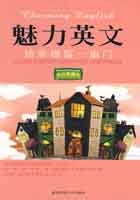
第3章 爱,永远禁不起等待 (2)
2. On October 17, 1826, Carlyle married his secretary Jane Welsh. She was an intelligent, attractive and somewhat temperamental daughter of a well-to-do doctor. They had their quarrels and misunderstandings, but still loved each other dearly.
3. After their marriage, Jane continued to serve as his secretary. But, after several years of marriage, Jane became ill. Being a hard worker, Carlyle became so absorbed in his writings that he let Jane continue working for several weeks after she became ill. She had cancer, and though it was one of the slow growing kinds, she finally became confined to her bed. Although Carlyle loved her dearly, he very seldom found time to stay with her long. He was busy with his work.
4. When Jane died they carried her to the cemetery for the service. The day was a miserable day. It was raining hard and the mud was deep. Following the funeral Carlyle went back to his home. He was taking it pretty hard. He went up the stairs to Jane’s room and sat down in the chair next to her bed. He sat there thinking about how little time he had spent with her and wishing so much he had a chance to do it differently. Noticing her diary on a table beside the bed, he picked it up and began to read it. Suddenly he seemed shocked. He saw it. There, on one page, she had written a single line. “Yesterday he spent an hour with me and it was like heaven; I love him so.”
5. Something dawned on him that he had not noticed before. He had been too busy to notice that he meant so much to her. He thought of all the times he had gone about his work without thinking about and noticing her. Then Carlyle turned the page in the dairy. There he noticed that she had written some words that broke his heart. “I have listened all day to hear his steps in the hall, but now it is late and I guess he won’t come today.”
6. Carlyle read a little more in the book. Then he threw it down and ran out of the house. Some of his friends found him at the grave, his face buried in the mud. His eyes were red from weeping. Tears continued to roll down his cheeks. He kept repeating over and over again, “If I had only known, if I had only known…” But it was too late for Carlyle. She was dead.
7. After Jane’s death, Carlyle made little attempt to write again. The historians say he lived another 15 years, “weary, bored and a partial recluse.” I shared the story with you in the hope that you will not make the same mistake. While our loved ones must have the money we make to live, it is the love that they really want. Give it now before it is too late.
1. 托马斯?卡莱尔(1795—1881)是苏格兰的散文家和历史学家,也是世界上一流的作家。但无论这位作家有多么地了不起,他毕竟也是一个凡人,凡人就难免会犯错误。
2. 1826年10月7日,卡莱尔与他的秘书简?威尔斯结了婚。简的父亲是一位非常富有的医生。简聪明、美丽,但就是有点喜怒无常。虽然夫妇俩不时也会吵吵架,但感情还是蛮好的。
3. 结了婚后,简仍给卡莱尔当秘书。可是几年后,简却病倒了。但简还是继续带病工作了好几周,由于卡莱尔对写作非常地投入,所以他并没有阻止简。简得了癌症,虽然发作的比较慢,但最终,她还是病倒在床。尽管卡莱尔非常地爱简,但因为忙于工作,他很少抽时间来陪她。
4. 简死后,她的亲朋好友都到她的墓地参加葬礼。那是一个悲痛的日子。天上下着滂沱大雨,道路泥泞不堪。葬礼后,卡莱尔回到家里,心情非常沉重。他走上楼梯,来到简的房间,坐在她床边的椅子上。回想起自己很少抽时间陪伴爱侣,卡莱尔非常地后悔,恨不得时间可以倒流。卡莱尔瞥见桌子上放着简的日记本,便拿起来看。突然,他好像感到非常震惊。他看到了这样的一句话,“昨天,他陪了我一个小时,我感觉到了天堂般的幸福,我喜欢他这样做。”
5. 他开始意识到一些曾被自己忽略的事情。他一直以来都忙于工作,竟然不知道妻子是那么地需要自己。他回想起自己埋头工作,置妻子于一边的日子。翻看着简的日记,他留意到几句令他伤心欲绝的话:“我今天一整天都在留意他的脚步声,但天色已晚,我想他今天不会来了。”
6. 卡莱尔又读了一会儿,然后丢下日记本,冲出了屋外。朋友们在墓地里找到了他。他的脸粘满了泥浆,眼睛哭得红肿不堪,眼泪不停地在脸庞上滑落,他不停地念叨着,“假如我知道,假如我知道……”可是对于卡莱尔来讲,一切都太迟了,简已经不在人世了。
7. 自从简死后,卡莱尔就没怎么再写作了。据历史学家称,在他妻子死后的15年,他的生活完全变了样,他过的是“苦闷、无趣、孤寂的遁世生活”。我把这个故事告诉大家,就是希望大家不会犯同样的错误,以致让悲剧重演。爱人是需要我们努力工作挣钱,但其实他(她)们更需要的是我们的爱。趁还来得及,去关怀你的爱人吧。
When Will The Moon Be Clear And Bright? 明月几时有
1. With a cup of wine in my hand, I ask the blue sky.
2. I don’t know what season it would be in the heavens on this night.
3. I’d like to ride the wind to fly home.
4. Yet I fear the crystal and jade mansions are much too high and cold for me.
5. Dancing with my moon-lit shadow,
6. It does not seem like the human world.
7. The moon rounds the red mansion Stoops to silk-pad doors,
8. Shines upon the sleepless Bearing no grudge,
9. Why does the moon tend to be full when people are apart?
10. People may have sorrow or joy, be near or far apart,
11. The moon may be dim or bright, wax or wane,
12. This has been going on since the beginning of time.
13. May we all be blessed with longevity though far apart, we are still able to share the beauty of the moon together?
1. 明月几时有,把酒问青天。
2. 不知天上宫阙,今夕是何年。
3. 我欲乘风归去,
4. 又恐琼楼玉宇,高处不胜寒。
5. 起舞弄清影,
6. 何似在人间。
7. 转朱阁,低绮户,
8. 照无眠。
9. 不应有恨,何事长向别时圆。
10. 人有悲欢离合,
11. 月有阴晴圆缺,
12. 此事古难全。
13. 但愿人长久,千里共婵娟。
Love And Time爱和时间
1. Once upon a time, there was an island where all the feelings lived: Happiness, Sadness, Knowledge, and all of the others, including Love. One day it was announced to the feelings that the island would sink, so all constructed boats and left. Except for Love.
2. Love was the only one who stayed. Love wanted to hold out until the last possible moment.
3. When the island had almost sunk, Love decided to ask for help.
4. Richness was passing by Love in a grand boat. Love said, “Richness, can you take me with you?”
5. Richness answered, “No, I can’t. There is a lot of gold and silver in my boat. There is no place here for you.”
6. Love decided to ask Vanity who was also passing by in a beautiful vessel. “Vanity, please help me!”
7. “I can’t help you, Love. You are all wet and might damage my boat,” Vanity answered.
8. Sadness was close by so Love asked, “Sadness, let me go with you.”
9. “Oh … Love, I am so sad that I need to be by myself!”
10. Happiness passed by Love, too, but she was so happy that she did not even hear when Love called her.